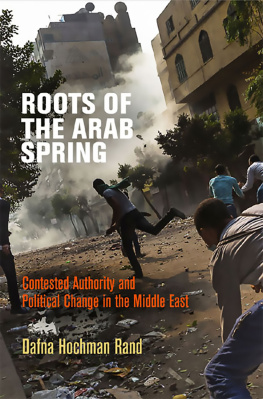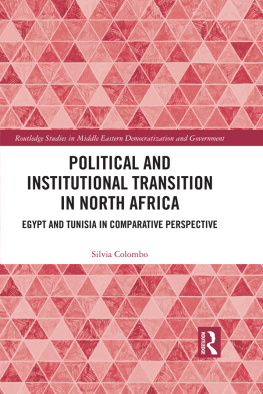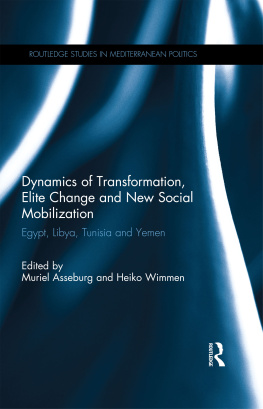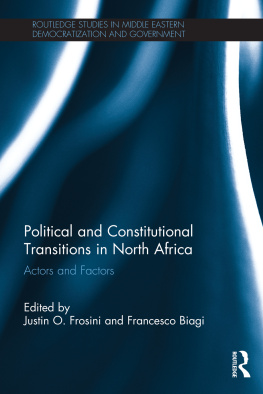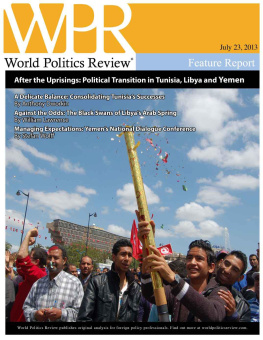UNFINISHED REVOLUTIONS
Unfinished Revolutions
Yemen, Libya, and Tunisia after the Arab Spring
IBRAHIM FRAIHAT
Yale
UNIVERSITY PRESS
NEW HAVEN AND LONDON
Published with assistance from the Louis Stern Memorial Fund.
Copyright 2016 by Ibrahim Fraihat.
All rights reserved.
This book may not be reproduced, in whole or in part, including illustrations, in any form (beyond that copying permitted by Sections 107 and 108 of the U.S. Copyright Law and except by reviewers for the public press), without written permission from the publishers.
Yale University Press books may be purchased in quantity for educational, business, or promotional use. For information, please e-mail (U.K. office).
Set in Electra LH type by Newgen North America.
Printed in the United States of America.
ISBN: 978-0-300-21563-2 (hardback : alk. paper)
Library of Congress Control Number: 2015946973
A catalogue record for this book is available from the British Library.
This paper meets the requirements of ANSI/NISO Z39.481992 (Permanence of Paper).
10 9 8 7 6 5 4 3 2 1
For those who spoke out against oppression
but died before they saw justice prevail
CONTENTS
ACKNOWLEDGMENTS
When I told my wife I was going to Sanaa after the fall of former president Ali Abdullah Saleh, she became very concerned, even though it was certainly not my first visit to the country. Months later, her concerns only intensified when she learned that I was also going to Libya after Muammar Qaddafis removal from power. Why do you go to conflict zones in the middle of all this instability? Its not safe. I wasnt choosing to do this now, I repliedit was a choice I made fifteen years ago when I began my Ph.D. program in conflict resolution at George Mason University. It was a conscious decision to dedicate the rest of my career to understanding the phenomenon of conflict and how societies can work to bring these conflicts to an end.
Given my academic background, I immediately realized that the real challenge for Arab Spring societies would begin the day they toppled their autocratic rulers. They faced the massive task of rebuilding Arab societies that have been wracked by colonialism and dictatorships for the past century. Changing leaders can take days but changing institutions and rebuilding states can take years, if not decades. There is no better testament to this than the American invasions of Iraq and Afghanistan, which toppled regimes in a few days but failed to rebuild states over the next fourteen years.
Whether they follow civil wars, dictatorships, or foreign occupation, transitions to a new state of civil peace are often chaotic, cumbersome, lengthy, and even violent. Arab societies are no exception. The idea of this book comes from the understanding that, in fact, there has been no such successful transition in the recent history of the Arab world, which only heightens the risk of societies sliding into chaos or even greater violence, as has happened in Yemen and Libya. Transition in Iraq following the American invasion twelve years ago has failed, and the transitions in Egypt, Libya, Yemen, and even Tunisia continue to struggle. The serious lack of expertise in how these transitions unfold and how to respond to them in an Arab regional context made research that responds to this gap necessary.
The search for ground truth has rigorously guided this three-year research project, incorporating over two hundred interviews with national figures in Libya, Yemen, and Tunisia. I spoke with senior government officials, heads of political parties, representatives of civil society organizations, revolutionary and militia leaders, former regime loyalists, tribal leaders, members of displaced communities, scholars, journalists, and officers in a number of international organizations. This approach aims to ensure that the research addresses the real challenges facing Arab societies in transition by examining the views of the concerned actors themselves: how they see these transitions, what is at stake for them, and what it would take to deal with their concerns. It allowed those most affected by the transition to speak for themselves and express what solutions they want to see rather than proposing ready-made formulas extracted from the literature.
There has never been a dull moment in three years of conducting this research. I have had to reschedule research trips at the last minute time and again, once after one of the conflict parties closed the Sanaa airport. I found myself walking in remote areas in Yemen with a dozen armed men taking me to interview their tribal leader. Conversations with internally displaced communities in the Nafousa Mountains and other remote areas of Libya were difficult and disheartening. Candid conversations with Libyan revolutionary leaders in their military bases were particularly enlightening. When I traveled to Tunisia, my wife was relieved that I was finally going to a relatively stable and safe area. But she was soon concerned again following news that violent clashes had erupted in the Tadamun neighborhood in Tunis after authorities banned the annual Salafi conference that was planned in the city of Kairouan.
Writing on the political developments in the Middle East region has meant trying to hit a moving target. By the time you finish an article on any particular subject it is probably obsolete. This book has avoided focusing on fast-moving events such as elections or specific crises. Instead, it targets strategic themes that are likely to shape the future of these transitions for years or even decades to come. Disarmament of ex-combatants, displacement, national dialogue, institutional reform, and truth seeking remain a core set of issues. Even countries that underwent similar transitions decades ago are still debating the best approaches to dealing with their pasts and to properly addressing the traumas of victims and their relatives.
These themes are relevant not only to the future of Yemen, Libya, and Tunisia but also to other countries in the region that will eventually face transitions of their own. Syria, for example, will never be able to undergo a successful transition without addressing the millions of currently displaced and the enormous number of would-be ex-combatants. It will have to also deal with members of the former regime, accountability, reparations, investigating the truth of the past, and so on. This book affords these countries the chance to learn about challenges, mistakes, and lessons learned by their regional neighbors in Libya, Tunisia, and Yemen. There is no need to reinvent the wheel.
This research project results from the input of countless people across the Arab world, more than I can mention here. I am indebted to all of them for their support, as the project would never have been completed without their patience, along with their belief in supporting successful, smooth, and non-violent transitions in Arab societies. Some two hundred people gave me the time to discuss their views of the transition and how it could best be achieved. I am deeply grateful for the invaluable contributions from my assistants in Libya, Yemen, and Tunisia: Sufyan Omeish, Abdulhakim Helal, and Hend Hassassi, respectively. They worked incredibly hard in difficult circumstances to achieve what seemed at times an impossible mission, given the logistical difficulties posed by countries in the midst of revolutions. Their thoughts and feedback on the interview process were extremely helpful.
I am immensely thankful to Bill Hess, my research assistant at Brookings, who worked tirelessly to ensure the highest quality and standards for his contributions. With incredible patience and attention to detail, he gave me great suggestions for improving the manuscript while tackling the many challenges we encountered. Bill was always the first person to read over my drafts, and he always responded with helpful feedback and clarifying edits.
Next page

